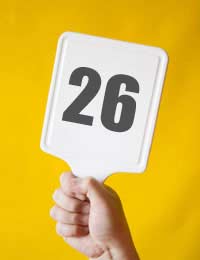How to Bid at an Auction

On the face of it, nothing could be easier than bidding at an auction. You simply make your bid and hope for the best. But bidding can be an art form and the more you understand it, the more likely you’ll be successful at auctions.
At in-person auctions you’ll generally be there to bid yourself, although you can also bid by phone, using either a third party or through an employee of the auction house.
Online auctions have developed their own bidding systems. The principal difference is that the bidder can nominate the highest amount he’s willing to pay. As the bidding increases, his bids rise until they reach that maximum amount. When a bidder has been outbid, he’s alerted by e-mail (or, if signed up for it, text message).
How Much to Bid
In essence, the amount you bid for an item is governed by two things – how much you can afford and how greatly you desire the item. If it’s something you really want, it can be easy to get carried away and end up bidding more than you can really afford, so it’s important to exercise strong self-discipline at an auction. Set an upper limit and stick to it.Take time to look at the items before the auction and survey with a critical eye. Even if you’ve been anticipating a particular object, if its condition doesn’t meet expectations, don’t bid on it.
In some cases you’ll have to register with the auction house before you can bid. This involves showing some identification and quite possibly producing a credit or debit card that the auction house can use if you are the winner on an item (you can, of course, also make other payment arrangements).
It can be worth gauging the competition for an item by holding back on your bid, especially if it’s something likely to fetch a good price. On the other hand, items with little value should be bid on early – there might be few other takers and you can obtain them cheaply. In other words, there’s also a strategy to bidding.
In an auction the auctioneer will generally state a price and if you’re willing to bid you’ll raise your hand, raise a numbered paddle or possibly nod your head (the source of many comedy sketches). From there the price goes up until only one bidder remains and he has then bought the item.
Bidding Online
Partly by virtue of the fact that you can automatically set a highest bid amount, online bidding requires a different style of thinking. But several other factors come into play. If possible, it’s best to monitor the last five or ten minutes of an auction. Often bids trumping yours will come in at the last minute (quite literally!) – this is a common strategy and one you can employ yourself. If you’re lucky you might have time to put in another bid. Don’t rely on being informed by e-mail or mobile, since there’s often a delay.It can be a wise move to set your highest bid for an odd amount. Instead of, say, £13.50, go for £13.61; someone else might bid £13.50, see you still have the bid and be discouraged. For an extra 11p, you’ll have secured the item.
- When Charity Auctions Go Wrong
- The Importance of the Home Valuation
- Beware of the Invisible Bidder
- The Legal Implications of Buying at Auction
- What Can Buy at an Auction?
- Why Buy at Auction Instead of at Shop?
- Buying a Holiday at Auction
- Tips For Buying Property at Auction
- Problem With an Item Bought at Auction
- Consumer Law and Auction Goods
- How to Avoid Forgeries, Fakes and Fraud at Auction
- Sealed Bid Buying
- Buying Collectibles and Memorabilia at Auction
- How to Avoid Buying a Wreck at a Car Auction
- How to Pay For Goods at Auction


Re: Problem With an Item Bought at Auction
Acquired a Russian Submarine clock from South Cheshire Autions when the package arrived I was having treatment when I…
Re: How to Set a Reserve Price in an Auction
I set a reserve price of £400 on my TGA Mobility Scooter - having researched online prices which showed my model…
Re: Beware of the Invisible Bidder
House on at auction online. Bidders must register - providing ID and contact details. I've registered had survey etc and am…
Re: Choosing Which Type of Auction to Sell At
Hello Explore Auctions, I would like you to evaluate my Silver item and send me a report about the item…
Re: Consumer Law and Auction Goods
I purchased a three-bedroom house from an Auction house when I had paid the money and then I received an email from the auction…
Re: How to Pay For Goods at Auction
A good blog always comes up with new and exciting information and while reading I felt that this blog has all those qualities…
Re: How to Avoid Forgeries, Fakes and Fraud at Auction
I won a few lots at auctionette They specified a slightly broken gilding at top of an edwardian mirror…
Re: Beware of the Invisible Bidder
One of the best posts I have ever come across. Not only did I learn a lot of hidden things, but I also got to know so many new…
Re: Problem With an Item Bought at Auction
Bought a beswick horse from The Action House on line timed auction.Got condition report first.All good.They offered…
Re: Consumer Law and Auction Goods
I had registered with easy live auction to bid for a watch I was successful in winning the item I duly paid the full amount by…